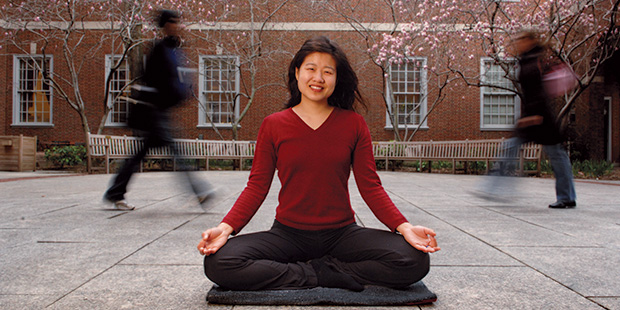Achieving Balance Through the Practice of Meditation
Printer Friendly VersionOnce a week, about a dozen students slip away from their daily grind to meditate in a darkened classroom in Furman Hall. They close their eyes and focus their minds on the rhythm of breathing as their leader, Julie Chen ’09, asks each person to rate his physical and emotional well-being on a scale of one to 10, then leads all of them in a variety of exercises, including mindfulness, mantra and deep concentration, in order to achieve inner peace.
Over the years, meditation has quietly slipped out of the ashram and into the mainstream. Under Chen’s initiative, this stress-relieving routine is the newest kind of practice studied at the Law School.
The summer before she matriculated, Chen walked into an East Village yoga school to take part in her first serious meditation session, motivated by a desire to understand herself a bit better. “I had meditated before—that’s not the correct way to put it—I had sat before,” she said. She emerged with a desire to practice daily, and the impulse to start the Open Meditation student group, or OM, which she runs with Sara Johnson ’09 and Patrick Garlinger ’09. Through meditation, says Chen, “we acquire a self-awareness to choose longer-term paths and actions that allow us to be of more service to the world.”
Chen and her fellow students are not alone. Lawyers in the United States and Europe have begun embracing meditation in response to alarming increases in depression, alcoholism and suicide rates in the profession. The American Bar Association regularly organizes meditative retreats for students, lawyers and judges, and mandatory CLE credits can be earned by taking part in meditation classes.
“The essence of the lawyer’s life is thought and consequences, and is almost entirely cerebral,” says Matthew Warner ’09, a weekly practitioner whose first experience with meditation was in one of Chen’s classes. “Meditation allows a break from the problems and conflict, allowing one to acquire perspective and remember why he or she came to the law.”

